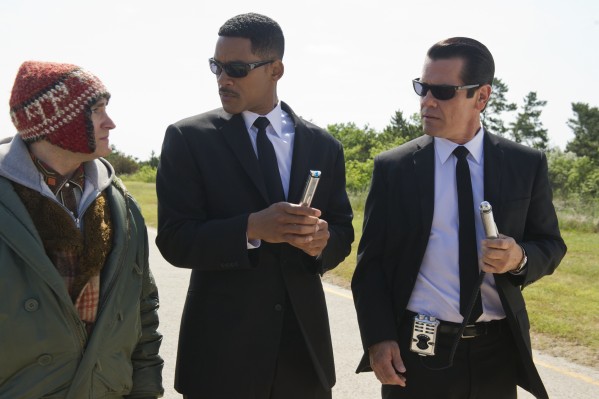 Poor Barry Sonnenfeld. In another life, he was a respected cinematographer, who shot the Coen Brothers’ Blood Simple and Raising Arizona, in addition to Misery. He was versatile and quirky. Then he became a director, and that sense of humor became compromised by Hollywood middle-brow aesthetics. The two Addams Family movies had moments, and Get Shorty was actually good, but mostly he’s stuck adding a shiny inconsequentiality to bad action comedies. (His last film as a director, RV in 2006 was a serious flop; he has directed some good TV shows though, notably the short-lived Pushing Daisies.)
Poor Barry Sonnenfeld. In another life, he was a respected cinematographer, who shot the Coen Brothers’ Blood Simple and Raising Arizona, in addition to Misery. He was versatile and quirky. Then he became a director, and that sense of humor became compromised by Hollywood middle-brow aesthetics. The two Addams Family movies had moments, and Get Shorty was actually good, but mostly he’s stuck adding a shiny inconsequentiality to bad action comedies. (His last film as a director, RV in 2006 was a serious flop; he has directed some good TV shows though, notably the short-lived Pushing Daisies.)
I’m sure he cries all the way to the bank, though, as he has directed all of the Men in Black films, including 3, which comes out Friday. These are hugely popular, although frankly, I’ve always been at a loss for why. They are action-comedies that have predictable action and aren’t very funny; special effects spectaculars that undercut their special effects with dumb humor. They have stretched them out over 15 years, so at least we only get bored once in a while, not on a semi-annual basis.
Men in Black 3 is clearly the best in the series, though that is akin to saying the third bout of cholera was the mildest. What started out as a vehicle for Tommy Lee Jones (he got top billing in the first one, remember?) has now marginalized him to the extent he disappears after 25 minutes, not to return again until the last scene. (It’s just as well: He’s begun to look like a saddle with eyebrows.)
Not that his character is gone entirely. In a plot stolen straight from Star Trek (both the original series’ “City on the Edge of Forever” and the fourth film), Agent J (Will Smith) travels back to the 1960s to keep Jones’ Agent K (played as a younger man by Josh Brolin in a spot-on impersonation) from being assassinated ante hoc, and exposing the world to destruction from Boris the Animal (Jemaine Clement).
The movie misses nearly every opportunity to do something interesting with the character; as a black man in the 1960s, there’s plenty of racial humor to be explored with Agent J, though it’s limited here to one scene with racist cops. (Who wouldn’t want to see a few minutes of Mad Men in Black with a Jon Hamm cameo?!) The time travel element feels lazy and tacked on (Agent J uses it multiple times and wants to change history by killing Boris, not preserve the original timeline, so honestly, there are no stakes here — he could just keep going back and changing things until he gets them right … and considering the big twist, you wonder why he doesn’t).
The comedy falls flatter than Debra Messing after a breast reduction. An early zinger with the punchline “Sugar?” was met with crickets from the preview audience, and there was never a Bridesmaids-level guffaw from anyone throughout the movie. What good is a comedy that doesn’t make you laugh? Chuckles and a smirking irony should only take you so far.
All of which begs the question: Why do they keep making these movies … and why people keep seeing them? The MIB franchise surfs on the smarmy attitude of Will Smith, who needs a hit almost as much as Sonnenfeld. (His last film, Seven Pounds, was a disappointment four years ago, and Hancock before that, while a hit, cost him a lot of good will.) But the additions of Michael Stuhlbarg as a Cassandra-like seer and Emma Thompson in a too-brief role as the new head of the MIB agency give it a fresh identity. Even a scene with Andy Warhol gives a hint of gay appeal — finally. Although in a summer flush with alien invasions —the disastrous Battleship, The Avengers, the upcoming Prometheus, this — there are too many other foreigners to spend your time worrying about to waste too much energy on this retread. I’d probably go back to see Thor and Capt. America face-off again sooner than slap down money for MIB3.















